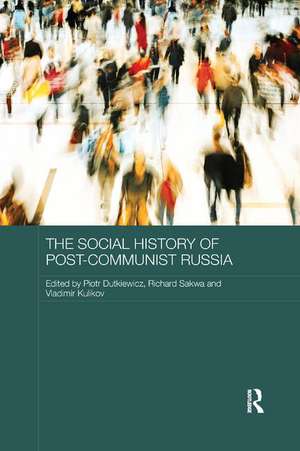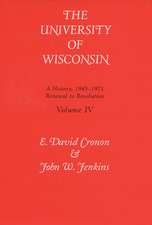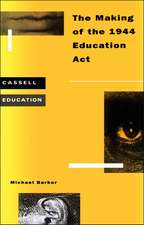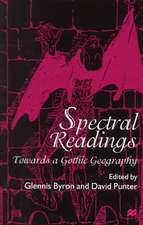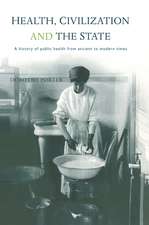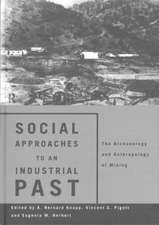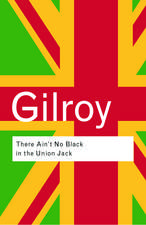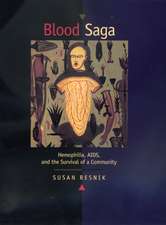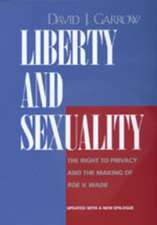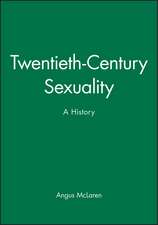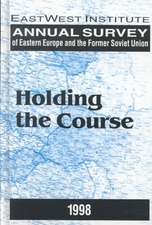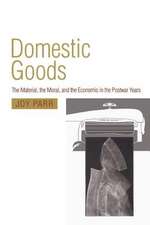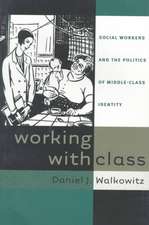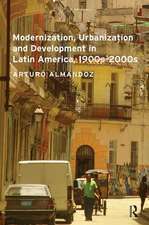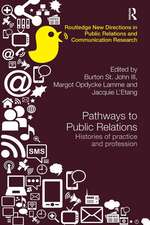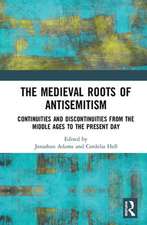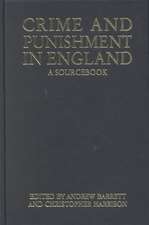The Social History of Post-Communist Russia: Routledge Contemporary Russia and Eastern Europe Series
Editat de Piotr Dutkiewicz, Sakwa Richard, Kulikov Vladimiren Limba Engleză Paperback – 12 ian 2018
| Toate formatele și edițiile | Preț | Express |
|---|---|---|
| Paperback (1) | 437.89 lei 6-8 săpt. | |
| Taylor & Francis – 12 ian 2018 | 437.89 lei 6-8 săpt. | |
| Hardback (1) | 1169.16 lei 6-8 săpt. | |
| Taylor & Francis – 14 dec 2015 | 1169.16 lei 6-8 săpt. |
Din seria Routledge Contemporary Russia and Eastern Europe Series
-
 Preț: 309.79 lei
Preț: 309.79 lei -
 Preț: 326.49 lei
Preț: 326.49 lei -
 Preț: 326.15 lei
Preț: 326.15 lei - 9%
 Preț: 1010.71 lei
Preț: 1010.71 lei -
 Preț: 321.03 lei
Preț: 321.03 lei -
 Preț: 302.33 lei
Preț: 302.33 lei -
 Preț: 325.21 lei
Preț: 325.21 lei - 9%
 Preț: 934.70 lei
Preț: 934.70 lei -
 Preț: 318.10 lei
Preț: 318.10 lei -
 Preț: 379.30 lei
Preț: 379.30 lei - 18%
 Preț: 1111.51 lei
Preț: 1111.51 lei - 18%
 Preț: 1058.79 lei
Preț: 1058.79 lei - 25%
 Preț: 824.70 lei
Preț: 824.70 lei -
 Preț: 464.54 lei
Preț: 464.54 lei - 18%
 Preț: 950.71 lei
Preț: 950.71 lei - 18%
 Preț: 1168.76 lei
Preț: 1168.76 lei - 24%
 Preț: 130.54 lei
Preț: 130.54 lei - 26%
 Preț: 821.46 lei
Preț: 821.46 lei - 18%
 Preț: 1169.78 lei
Preț: 1169.78 lei -
 Preț: 413.98 lei
Preț: 413.98 lei -
 Preț: 387.49 lei
Preț: 387.49 lei -
 Preț: 406.52 lei
Preț: 406.52 lei - 18%
 Preț: 1059.93 lei
Preț: 1059.93 lei - 18%
 Preț: 1218.26 lei
Preț: 1218.26 lei -
 Preț: 418.13 lei
Preț: 418.13 lei - 18%
 Preț: 1171.89 lei
Preț: 1171.89 lei - 18%
 Preț: 1057.57 lei
Preț: 1057.57 lei -
 Preț: 413.37 lei
Preț: 413.37 lei - 18%
 Preț: 707.96 lei
Preț: 707.96 lei - 18%
 Preț: 1058.65 lei
Preț: 1058.65 lei - 18%
 Preț: 948.84 lei
Preț: 948.84 lei - 18%
 Preț: 706.91 lei
Preț: 706.91 lei - 18%
 Preț: 1059.84 lei
Preț: 1059.84 lei -
 Preț: 488.33 lei
Preț: 488.33 lei - 18%
 Preț: 1056.28 lei
Preț: 1056.28 lei -
 Preț: 390.12 lei
Preț: 390.12 lei - 18%
 Preț: 1053.16 lei
Preț: 1053.16 lei - 18%
 Preț: 1056.28 lei
Preț: 1056.28 lei - 28%
 Preț: 850.91 lei
Preț: 850.91 lei - 18%
 Preț: 1050.78 lei
Preț: 1050.78 lei - 18%
 Preț: 1166.68 lei
Preț: 1166.68 lei - 18%
 Preț: 1058.79 lei
Preț: 1058.79 lei - 18%
 Preț: 1958.23 lei
Preț: 1958.23 lei - 18%
 Preț: 1221.74 lei
Preț: 1221.74 lei
Preț: 437.89 lei
Nou
Puncte Express: 657
Preț estimativ în valută:
83.79€ • 89.60$ • 69.86£
83.79€ • 89.60$ • 69.86£
Carte tipărită la comandă
Livrare economică 17 aprilie-01 mai
Preluare comenzi: 021 569.72.76
Specificații
ISBN-13: 9781138477117
ISBN-10: 1138477117
Pagini: 332
Ilustrații: 92
Dimensiuni: 156 x 234 x 18 mm
Greutate: 0.49 kg
Ediția:1
Editura: Taylor & Francis
Colecția Routledge
Seria Routledge Contemporary Russia and Eastern Europe Series
Locul publicării:Oxford, United Kingdom
ISBN-10: 1138477117
Pagini: 332
Ilustrații: 92
Dimensiuni: 156 x 234 x 18 mm
Greutate: 0.49 kg
Ediția:1
Editura: Taylor & Francis
Colecția Routledge
Seria Routledge Contemporary Russia and Eastern Europe Series
Locul publicării:Oxford, United Kingdom
Public țintă
Postgraduate and UndergraduateCuprins
1.Introduction: actors, attitudes and practices in the evolution of Russian society since 1991 2. A people in the absence of the people, or a view of postcommunism from below 3. Economic and social development of post-communist Russia, 1991-2014 4. Transformation for the people or for the elite? 5. The puzzle of public opinion: popular support for the transition to capitalism 6. The reforms of the 1990s in the eyes of Russian society 7. Changes in Russian social structure in the postcommunist period 8. New Russia: the evolution of Russian public opinion in 1989-2014 9. The psychological transformation of society in post-Soviet Russia 10. The evolution of ethnic and religious relations in Russia since the 1980s 11. Society and elites in Russian regions: post-Soviet changesNatalia Zubarevich 12. Social investment: experience and lessons of the last twenty years 13. Russian elites: a strategy of ‘self –isolation’ 14. Conclusion: bringing the people back in 15. Afterword to the Russian edition
Notă biografică
Piotr Dutkiewicz is Professor of Political Science and Director of the Centre for Governance and Public Policy at Carleton University in Ottawa, Canada.
Richard Sakwa is Professor of Russian and European Politics at the University of Kent, UK.
Vladimir Kulikov is Associate Professor and Deputy Head of the Department of State Politics, Faculty of Political Science, Lomonosov Moscow State University.
Richard Sakwa is Professor of Russian and European Politics at the University of Kent, UK.
Vladimir Kulikov is Associate Professor and Deputy Head of the Department of State Politics, Faculty of Political Science, Lomonosov Moscow State University.
Descriere
This book tells the untold story of how ordinary Russian people coped with Russia’s transformations after the end of communism. This book, which includes findings from interviews, memoirs, public opinion surveys and press articles, portrays a multi-ethnic, multi-confessional society that was affected by deep and varied changes in diverse ways. The book covers economic developments, social changes, the psychological impact of the changes and the impact on public opinion, and how different regions were affected differently. Overall, the book reveals the hidden dynamics of Russian society, and shows how millions of Russians coped and maintained the integrity and stability of the country.
